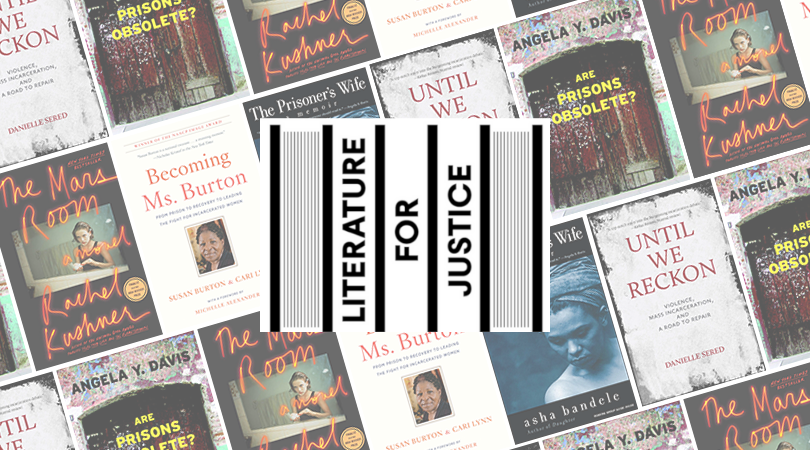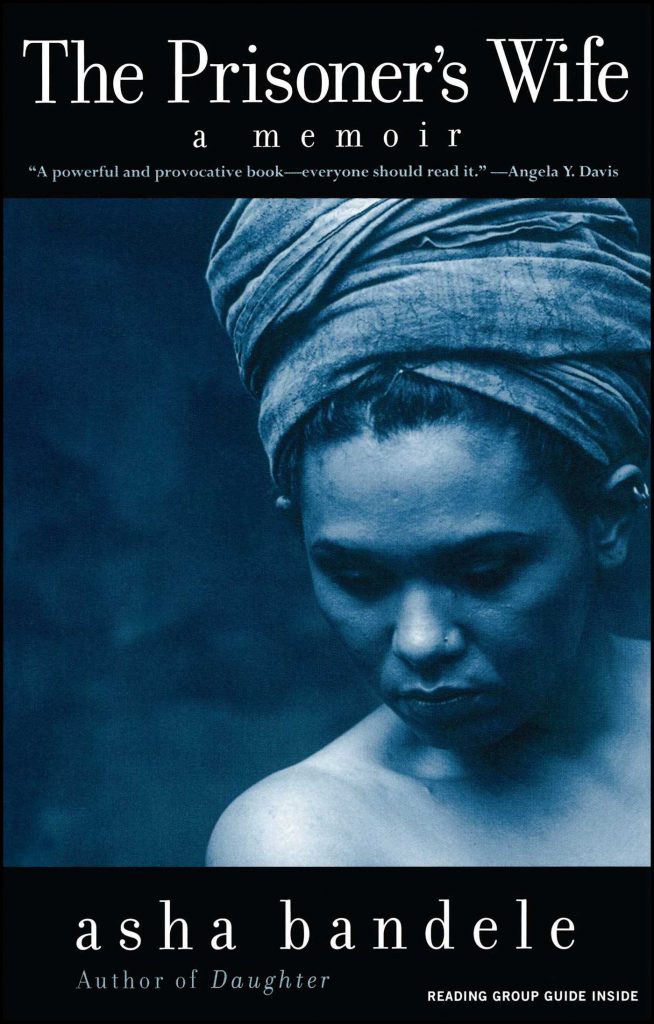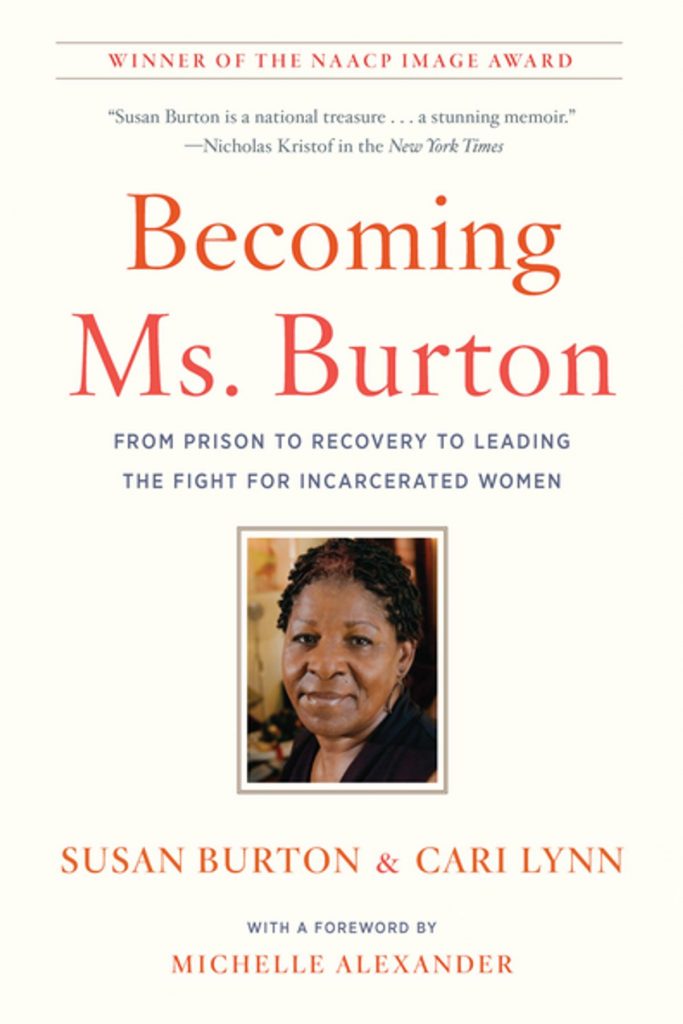
Last year, the National Book Foundation (with help from the Art for Justice Fund) launched Literature for Justice, a three-year program dedicated to heralding stories that contextualize and humanize the experiences of incarcerated people in the United States.
When the committee shared this year’s reading list, they stated: “In the second year of this initiative, the selection committee deemed it crucial to focus on those often neglected in public conversations on mass incarceration: women and families. The list centers first-person narratives from formerly incarcerated authors, partners of those behind bars, and leaders of prison reform and abolition movements since the 1980s.”
This year, five esteemed writers and leaders within the space of mass incarceration and social justice—Michelle Alexander (The New Jim Crow), Reginald Dwayne Betts (Felon), Zachary Lazar (Vengeance), Kelly Lytle Hernandez (Migra! A History of the U.S. Border Patrol), and Shaka Senghor (Writing My Wrongs)—formed the committee that selected the reading list. The titles listed below convey inmates’ real life experiences and confront many often-overlooked aspects of mass incarceration in America.
*

The Prisoner’s Wife by asha bendele
(Scribner, 1999)
“A haunting, intensely emotional memoir of the middle-class author’s relationship with a man jailed for murder. In lyrical, flowing prose, columnist and performance poet Bandele…presents piercing portraits of herself, the man she loves, and a prison system designed to stifle all sensibility … Mesmerizing and disconcerting, offering insights into why caged birds sing.”
“Her writing soars with emotion. And the reader’s emotions soar as well, not because of a shared experience but because her highly polished and skillful writing makes one feel her pain and joy. This is a romantic but realistic story, told with a directness and honesty that make us know that however impossible the problems asha and Rashid face, we can question neither her motives nor her sanity.”

Becoming Ms. Burton by Susan Burton and Cari Lynn
(The New Press, 2017)
“Through the lens of her own painful but compelling history, Burton illuminates the tragic but often marginalized experiences of the tens of thousands of women who find themselves behind bars … Burton is brutally frank and never self-aggrandizing. Her voice rings with authenticity whether when describing childhood abuse, attempts to reunite with her estranged daughter, or the constant frustration with facing government officials who turn a deaf ear to her pleas for change. The parallels she draws with her slave ancestry are especially powerful … Burton and co-author journalist Cari Lynn start each chapter with a grim statistic, reminding the reader, for example, that the United States imprisons more people than any other country in the world, with 2.2 million people behind bars. These figures are jarring, and serve a dual purpose. They frame a section of Burton’s singular life, but they also weld her story to the lives of many other women, underscoring that her history, in turn traumatic and audacious, is not unique … rarely has such a powerful, personal perspective been made available to us, from a woman who has been on both sides of the prison bars. Our understanding of the criminal justice system is immeasurably strengthened by Susan Burton’s fierce, compassionate, and expressive voice.”
–Elaine Elinson, Los Angeles Review of Books
“…a compelling memoir … rarely do individuals who have been or are currently incarcerated have a place at the policy table … This first-person account of the trauma that incarceration inflicts on individuals and families ties those policy discussions to lived reality. It may also help the incarcerated, the formerly incarcerated, and their families know that they are not alone.”
 Are Prisons Obsolete? by Angela Y. Davis
Are Prisons Obsolete? by Angela Y. Davis
(Seven Stories Press, 2003)
“In this extraordinary book, Angela Davis challenges us to confront the human rights catastrophe in our jails and prisons. As she so convincingly argues, the contemporary U.S. practice of super-incarceration is closer to new age slavery than to any recognizable system of ‘criminal justice.”
–Mike Davis, author of Dead Cities
“In this brilliant, thoroughly researched book, Angela Davis swings a wrecking ball into the racist and sexist underpinnings of the American prison system. Her arguments are well wrought and restrained, leveling an unflinching critique of how and why more than 2 million Americans are presently behind bars, and the corporations who profit from their suffering.”
–Cynthia McKinney, former Congresswoman from Georgia
 The Mars Room by Rachel Kushner
The Mars Room by Rachel Kushner
(Scribner, 2018)
“There’s very little sunlight, literally and metaphorically, in Kushner’s brilliant and devastating The Mars Room … The Mars Room is a necessarily claustrophobic book, but that’s not at all a bad thing. Kushner does a masterful job evoking the isolation and hopelessness intrinsic to a life behind bars; she never resorts to cliché or pathos, but still manages to convey the emotional torture to which prisoners are subjected on an hourly basis … Kushner doesn’t make a false move in her third novel; she writes with an intelligence and a ferocity that sets her apart from most others in her cohort. She’s a remarkably original and compassionate author, and The Mars Room is a heartbreaking, true and nearly flawless novel.”
–Michael Schaub, NPR
“Kushner’s portrait of life inside the women’s prison is grainy and persuasive. It’s all here: the lice treatments, the smuggling of contraband in rectums and vaginas, the knifings, the cliques, the boredom, the heinous food … Kushner smuggles her share of humor into these scenes. Like Denis Johnson in Jesus’ Son, a book this novel references, she is on the lookout for bent moments of comic grace … If these prison scenes have a flaw, it’s that Kushner has clearly done so much research that it weighs her down a bit. It’s as if she feels compelled to report everything she’s learned. The Mars Room is a major novel, a sustained performance, one that broods on several exigent ideas … The Mars Room moves cautiously and slowly. It prowls rather than races. It is like a muscle car oozing down the side roads of your mind. There are times when you might wish it had more velocity, more torque, yet there are reasons it corners cautiously.”
–Dwight Garner, The New York Times
 Until We Reckon by Danielle Sered
Until We Reckon by Danielle Sered
(The New Press, 2019)
“Danielle Sered’s new book, Until We Reckon, is a must-read for anyone who works in the criminal courts, the many who care about making our streets and communities safer and all those who espouse concern for the simple concept of justice … Engrossingly written, Sered points out that treating violence solely as an individual’s pathology misses the mark, that that analysis importantly ignores the social context in which such crimes occur.”
–Eric Seiff, New York Law Journal
“…convincingly attacks the conventional wisdom about violent crimes, appropriate punishment, and how to repair the criminal (in)justice system … The author and her small staff listen carefully to victims of all kinds of violence … The author provides clear, specific evidence for her contention that the new conventional wisdom must be survivor-centered, accountability-based, safety-driven, and racially equitable. The case studies of restorative justice that punctuate every chapter offer undeniable proof that Common Justice’s tactics are succeeding and should be more widely applied … A top-notch entry into the burgeoning incarceration debate.”

